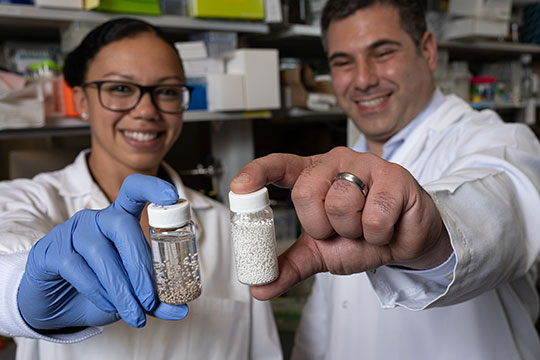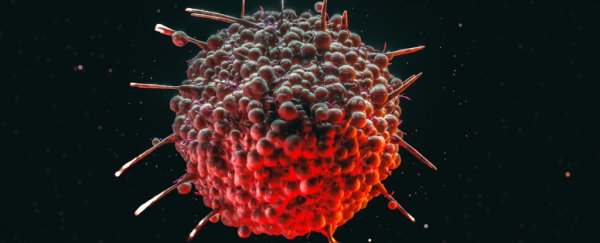An experimental new type of cancer treatment has yielded some impressive results in mice: the eradication of advanced-stage ovarian and colorectal cancer in the animals as little as six days.
The new therapy has only been tested in mice so far, so let's not get too excited just yet. However, the early signs are promising, and human clinical trials could be underway by the end of the year.
The treatment involves tiny 'drug factory' beads that are implanted into the body and deliver a continuous, high dose of interleukin-2 (IL2) – a natural compound that enlists white blood cells in the fight against cancer.
"We just administer once, but the drug factories keep making the dose every day, where it's needed until the cancer is eliminated," says bioengineer Omid Veiseh from Rice University in Texas.
"Once we determined the correct dose – how many factories we needed – we were able to eradicate tumors in 100 percent of animals with ovarian cancer and in seven of eight animals with colorectal cancer."
 The bead-like 'drug factories' held by Amanda Nash (left) and Omid Veiseh. (Jeff Fitlow/Rice University)
The bead-like 'drug factories' held by Amanda Nash (left) and Omid Veiseh. (Jeff Fitlow/Rice University)
Interleukin-2 is one of a group of immune system-triggering proteins called cytokines. Although cytokines are already used in cancer treatment for melanoma and renal carcinoma, but the problem scientists have is getting cytokines to fight tumors effectively while avoiding dangerously high levels of inflammation elsewhere in the body, causing dramatic side effects.
In this study, the beads were placed in the peritoneum, a sac-like lining around the intestines, ovaries, and other abdominal organs. That enables the drugs to specifically target the cancer without burdening the body in terms of volume or weight.
The dose of interleukin-2 given by these drug factories would be too toxic if delivered through an IV drip, but here it works because the high concentrations are focussed on the tumor. The concentration of the protein elsewhere in the body seems to be around 30 times lower than near the tumor, according to tests.
Each bead has an outer cell made of hydrogel which shields the cytokine-producing cells, protecting them from attack. These beads are recognized as foreign objects by the surrounding immune system, but not as immediate threats, which enables them to do their work. They can then be programmed to turn off automatically.
"We found foreign body reactions safely and robustly turned off the flow of cytokine from the capsules within 30 days," says Veiseh. "We also showed we could safely administer a second course of treatment should it become necessary in the clinic."
The drug factory beads can potentially be adopted for cancers elsewhere in the body, as long as there's a lining where they could house them, and they could be tweaked to deliver different types of drugs, the researchers say. It's a flexible system as well as an innovative one.
What's more, the drugs that are being used here have already been approved as safe for use in clinical trials, which should speed up the process. The final treatment should be minimally-invasive and relatively straightforward to administer.
"In this study, we demonstrated that the 'drug factories' allow regulatable local administration of interleukin-2 and eradication of tumors in several mouse models, which is very exciting," says Amir Jazaeri, a professor of gynecologic oncology and reproductive medicine at the University of Texas. "This provides a strong rationale for clinical testing."
The research has been published in Science Advances.
